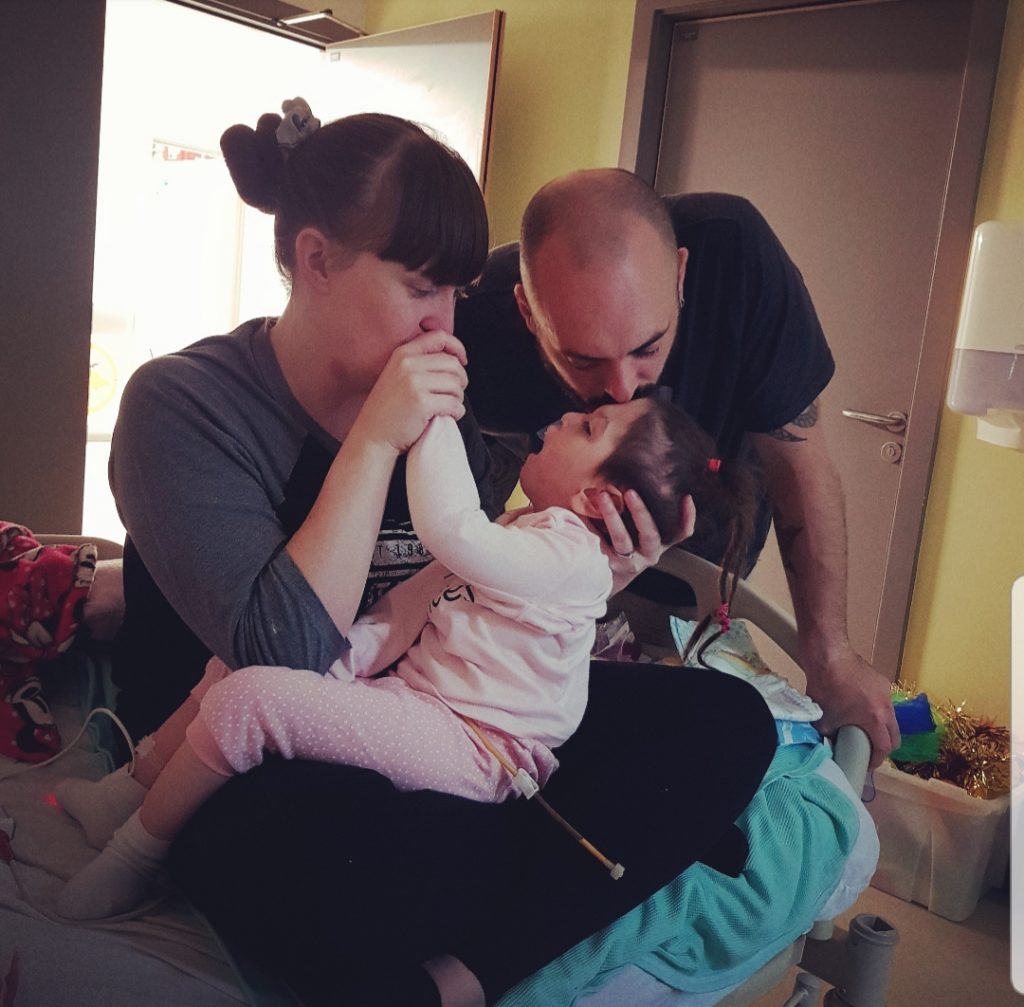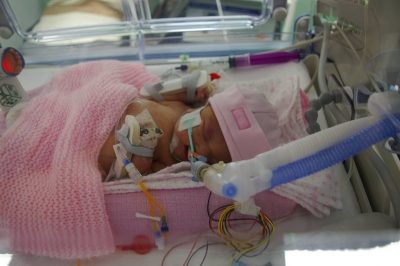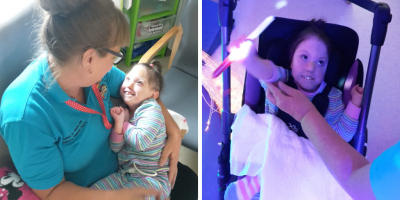Scarlett’s story

This is four year old Scarlett. She’s a happy little girl who loves music, painting, swimming and playing in the sensory room with her new friends, play specialists, Juliet and Catrin.
Scarlett has the rarest form of genetic disorder possible – she’s the only person in the world who has it. That means that when her parents Clair and Chris were given a diagnosis when she was six weeks old, there was no leaflet or website that they could turn to for information on what to expect. The only certainty they were given is that their daughter’s condition was life limiting and that she may not live more than a year.

Scarlett spent eight months of that first year on the neonatal unit at the University Hospital for Wales. In that time the new parents had to adjust to the fact that their daughter had problems with her sight, hearing, heart, kidneys and brain and lacked a central muscle which meant that she would never be able to walk or sit up unaided. At three months old, Scarlett also started experiencing seizures which became so severe that at one point, the medical team were preparing the parents for the imminent prospect of losing her.
At eight months, with the seizures stabilised by medication, the family travelled to Bristol where Scarlett had open heart surgery. Not long after she also underwent a gastrostomy, a procedure that allows her to receive nutrition straight in to her stomach.
Clair says: “We had a great few years after that. Scarlett finally came home and although it was a different life, it was a happy one. We went to playgroups together and to see our beloved Cardiff Devils play. And we learnt that Scarlett’s hearing and sight wasn’t as bad as originally thought. One of our favourite days out with her is a trip to the aquarium. There’s nothing more amazing than watching her face as she takes in the massive lit up tanks full of fish, especially as it’s the kind of thing we thought we’d never get to experience with her.”
Scarlett needs 24 hour supervision so Chris and Clair have always taken it in turns to stay up with her at night which is no mean feat considering that Chris also works full time and Clair cares for Scarlett all day too. Around Christmas time, they noticed that she had started to stop breathing for periods while she was asleep. After sleep studies at the Noah’s Ark Children’s Hospital for Wales revealed that her airway was being obstructed, a decision was made to remove Scarlett’s tonsils in an attempt to widen her airway. Though the operation went well, that night her oxygen levels plummeted suddenly and Scarlett was put on a ventilator.
An X-Ray on Scarlett’s chest showed that her diaphragm, which should be below the lungs, was up inside her chest and that as a result the main air passage to her lungs was very narrow. It also appeared that the device which had been inserted to support her heart was pressing on the airway. However, Scarlett’s medical team decided that it would be too dangerous to remove the device or even insert a stent to keep her airway open. The only option open to them was to perform a procedure to pull Scarlett’s diaphragm down to where it should be.
Chris says: “Unless you’ve met Scarlett when she’s well and you can see how much joy she gets from interacting with the world around her, your perceptions of her capabilities would be really low. “When we got to Bristol where they specialise in heart surgery for Scarlett’s operation she was sedated and ventilated and all the medical team there had to go on were her notes, which make very grim reading. They sensitively took us aside to discuss whether, if all she could do was breathe, it was a quality of life worth sustaining. But we know the person that Scarlett really is and we knew that we could get her back.”
Following her operation, Scarlett was completely reliant on the ventilator and every attempt to move her on to a lower level of support failed. After the seventh failed attempt, Chris and Clair were again taken aside to discuss ending their daughter’s care. An agreement was made that they would try one last time and this time – it worked!
During the next few weeks, Scarlett made steady progress and in July she was well enough to move from high dependency to Island ward, where she’s made a whole host of new friends. She still needs support with her oxygen levels but her parents are hopeful that she’ll soon be well enough to go home.
Chris says: “There are so many hard things about having a child with such chronic and complex needs as Scarlett. At first there was the shock diagnosis and the fact that we had to leave the neonatal unit each night without her for eight months. After that we had to face the ongoing unknowns of her condition and the responsibility of being just two people caring for her around the clock – Scarlett’s not a big fan of sleeping. Then of course there are the things that have happened this year. Four months ago we had a child with complex needs but she could breather for herself. We came in for what we thought was a routine operation and ended up nearly losing her, and we’re still here.”
“But none of that changes the fact that Scarlett has changed our lives entirely for the better. We won’t see our daughter off to university and I won’t get to walk her down the aisle so all that matters is now and the time we do have with her. We don’t know how long we’ve got so we’re making it all count and ensuring that she enjoys every minute of it.”
Chris and Clair are hugely grateful for the medical care Scarlett has received at the children’s hospital for Wales but also talk a lot about the additional things that make a hospital stay for a family like theirs so important. Clair explains: “The play specialists on the ward have done such an amazing job with Scarlett. They focus on what Scarlett can do rather than what she can’t and together we’ve found out that she has a love for music and singing and lights. They’ve taught me that despite Scarlett’s complex needs she can still enjoy the things that all children enjoy and they’ve taken the time to show me different ways to play with her. We’ve spent lots of time laughing together in the sensory room and doing messy play and along with how happy it makes her, we can see the difference all the mental stimulation makes.

“Play rooms on wards are great if your children are able to play independently but Juliet and Catrin bring the play to Scarlett and that makes it inclusive.”
“Having Scarlett has changed our perspective on life. It’s made us realise that we don’t need half of the stuff we own. We came in here four months ago with enough packed for a few nights stay, but despite that we’ve got by just fine with very little. Having a child who maybe doesn’t have much time makes you appreciate what you’ve got in the moment which is why we the play specialists and the sensory room have been such a massive part in our time here at the hospital. They’ve helped us get everything we can out of the invaluable time we have with her.”







